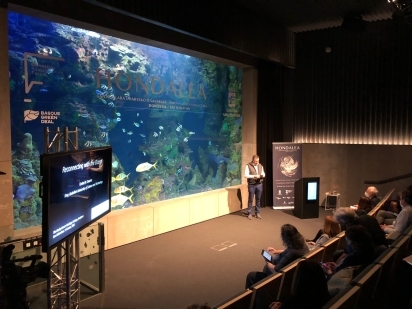The loss of marine habitats and species can be reversed by 2050
<p> The symposium "The Rocky Coast: Geology, Ecology, Sculpture" organised by the UPV/EHU Summer Courses brought together specialists in art, literature, geology and ecology on June 3 and 4 . The event, held at the Aquarium in San Sebastian, was part of the inauguration of the work Hondalea by Cristina Iglesias.</p>

Among the speakers at the symposium was the marine biologist and oceanographer Carlos Duarte, professor and researcher at King Abdullah University in Saudi Arabia and author of pioneering studies on the relationship between climate change and the oceans, ecosystem restoration and sustainable fishing. His research earned him the 2019 Fronteras del Conocimiento Award from the BBVA Foundation in the category of Ecology and Conservation Biology.
Carlos Duarte has contributed in recent decades to the knowledge of marine biodiversity and to defining strategies for the restoration of marine and coastal ecosystems. In the light of his research, we are at a key moment to assess the losses suffered, the achievements made in the last 30 years, to expose the challenges posed by climate change and to define policies to improve the health of the oceans.
Among the losses suffered, Carlos Duarte measures the loss of marine habitats such as mangroves, seagrass meadows and marshes to be at 50%, the decline of large marine animals at another 50% and the disappearance of species of fishing interest at up to 30%.
However, something changed three decades ago, with the implementation of policies to conserve species and improve water quality that are already bearing fruit. Initiatives to reduce chemical pollution, for example, have proved effective in studies such as the one carried out 10 years ago by the Malaspina expedition, which showed that the presence of lead in the water is a problem that has been solved thanks to the disappearance of leaded fuels in the 1980s. Other metals and organic pollutants with a major impact on marine life have also declined in the oceans.
By 2050, Carlos Duarte explained that it is possible to reverse the loss of marine ecosystems and biodiversity by paying special attention to the restoration policies that must be implemented this decade.
Healthy policies for the oceans
The ocean absorbs much of the excess heat generated by the greenhouse effect and a third of the carbon emitted into the atmosphere, but there is a limit to its role as a mitigator of climate change. Rising ocean temperatures, at 1 degree above pre-industrial levels, and accelerating sea level rise are of great concern for the future of humanity. By 2050, it is estimated that sea levels will have risen by 20-30 centimetres, with a consequent impact on coastal infrastructure. Climate change mitigation policies are therefore key to achieving healthier oceans.
Carlos Duarte also mentioned the presence of plastics in valuable ecosystems, such as seagrass meadows and mangroves, where they interfere with the natural cycle. The COVID 19 pandemic has overturned policies to ban single-use plastics, he added. Production was expected to decrease by 18% and in reality it has increased by 18%. Developing new recycling systems, biodegradable plastics and using these waste materials as a source of energy are strategies that can help mitigate the problem.
The oceanographer cited risks and losses, but also mentioned solutions that have been in place for years. In 2000, he said, he would have been very pessimistic when analysing the state of the oceans, but since 2010 there has been a real "wave of positive news" about successes in the recovery of threatened species and habitats. He believes that it is possible to achieve a healthy ocean by 2050 and, as an example, he mentioned the boost in marine surface protection, which in 2000 was only 0.3% and which 20 years later has grown to 8%. He also highlighted the exponential growth of marine and coastal ecosystem restoration projects: which has multiplied 9,000 times since 2000.
Among the actors of change, Carlos Duarte mentioned companies, which are driving actions to restrain climate change. As an example, he mentioned the investment in the recovery of underwater meadows and marshes, the first line of defence of our coasts against rising sea levels, as they reduce wave energy and deposit sediments that increase the seabed. "The problem of climate change is too important to be left to governments alone, we need to involve businesses and citizens," he added. Sustainability is going to be a sector that is going to increase its turnover and the interest of companies in participating is a fact.
In addition, Carlos Duarte pointed out the importance of developing sustainable fishing policies. The thresholds for food production on land are at the limit, but there are great options for producing food thanks to marine aquaculture, which will play an important role in the future of humanity. It can be made to have no environmental impact, he added, and to generate profits. Among the projects he is involved in, he cited work on algae and bivalve production, which also helps to clean up the marine environment. As far as wild stocks are concerned, the efforts invested in reducing fishing pressure since the 1990s have borne fruit but, in his opinion, the limitations must be reviewed so that species are not at the limit of exploitation and can recover better.
He said that humanity is well aware of the fundamental role that the oceans play in its health and wellbeing. It is a matter of valuing more than the mere economic services they provide (fishing, marine energy, mining, natural products) and assuming that the future of humanity depends, to a large extent, on the health of the oceans.

